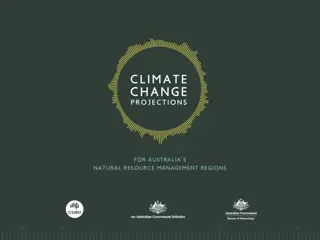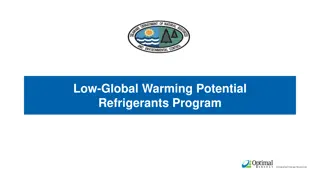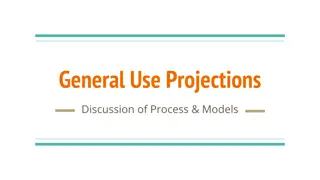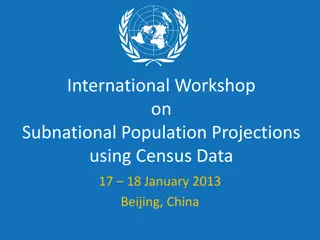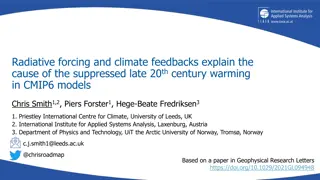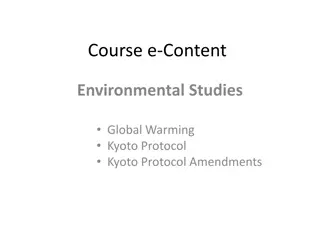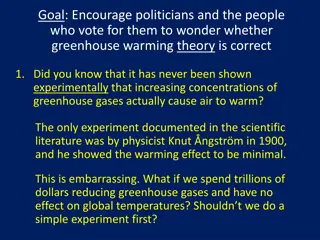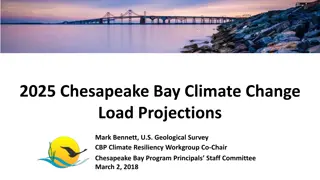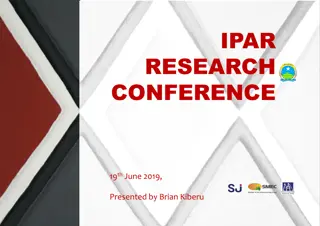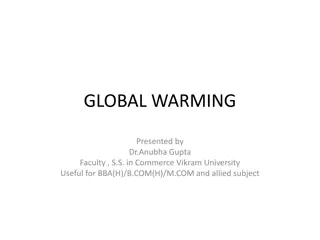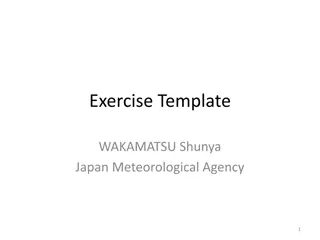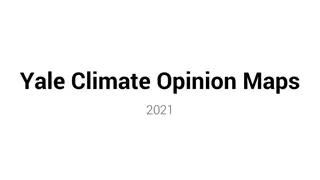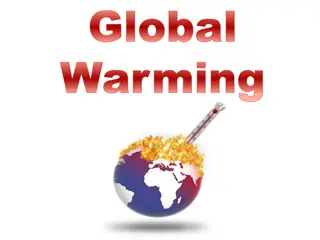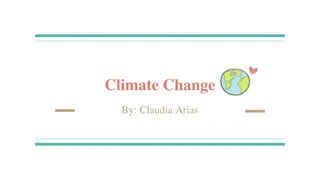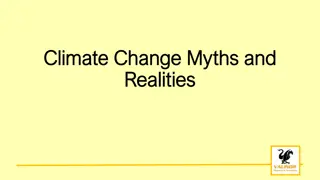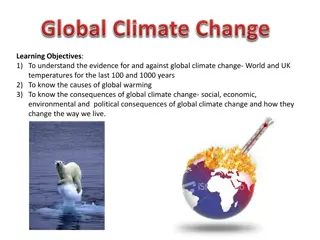Climate Future Discussion: Global Warming and Future Projections
The climate discussion presents images and text highlighting rising GHG concentrations, global temperature history, and IPCC projections for the future. It emphasizes the urgent need for action to combat climate change and mitigate its effects in the coming years.
Uploaded on Sep 30, 2024 | 0 Views
Download Presentation

Please find below an Image/Link to download the presentation.
The content on the website is provided AS IS for your information and personal use only. It may not be sold, licensed, or shared on other websites without obtaining consent from the author. Download presentation by click this link. If you encounter any issues during the download, it is possible that the publisher has removed the file from their server.
E N D
Presentation Transcript
Climate Future Good Morning, Vietnam Ivo Welch 02/17/2023
the weather out there today is hot and shitty with continued hot and shitty in the afternoon. Tomorrow a chance of continued crappy with a pissy weather front coming down from the north. Basically, it s hotter than a snake s ass in a wagon rut. Adrian Cronauer.
The Future is Not Certain This is a discussion of plausible ranges of paths over the next 100 years. Future discussions will be about what we can and should do about it
Atmospheric GHG Concentration History GHG concentration has been growing: stock in the atmosphere is 420 ppm now (base = 280 ppm), this is about 50% higher (doubling => about 3 C) current growth rate is 2.5 ppm/year. 2.5ppm is not so bad until you think in terms of generations emissions are accelerating but effects are more linearly increasing will continue growing for at least 30 more years more likely 60 more years.
Global Temperature History global temperature has been increasing not yet in equilibrium most relevant data: last 30-200 years increase attributable greatly or exclusively to GHG emissions the already-emitted gases suggest an equilibrium temperature increase of 1.5 C due to 50% GHG increase only 0.7-1 C has occurred to-date, the other half is still on its way, due to heat reservoirs and/or delaying SO2reflectivity from coal.
if this were the final equilibrium, but civilization is of course still pumping more GHGs, so we will push right through 1.5 C.
IPCC Projections Of Near Future intergovernmental panel on climate change. these are not the fossil-fuel folks, but the climate scientists that worry about warming. they are our main information source. data almost always objective, but occasionally (possibly) biased assessments.
RCP: representative concentration pathway, named based on increases in watts/m2, mostly about expected outcomes, but cognizant their RCPs are their expertise. their SCPs are more dubious. benchmarks: 1,360 W/m2on top of atmosphere (avg). 1,000 W/m2on ground (avg). climate change will likely be severe this is almost surely correct.
Relevant Realistic RCP Scenarios RCP 4.0 (extra 4 W/m2) 2.5 C. think from today, another +1.5 C. active tough-sacrifice intervention. RCP 6.0 (extra 6 W/m2) 3.0 C. think from today, another +2.0 C. very mild intervention. most likely Earth s current pathway opinion: only smart intervention can bend RCP lower
Irrelevant Unrealistic RCP Scenarios trains that have left station: RCP 2.5 forget it fat chance. RCP 8.0 forget it still historically matching clean tech has mostly obsoleted it. watch it many sites still publish alarmist assessments under RCP 8.0.
UN COP Treaty Negotiations COP (UN conference of the [197] parties) RCP 4 vs. RCP 6. not much chance that COP treaty could do better than RCP 4, or worse than RCP 6. whether you like it or not.
Part 1: Expected Change On RCP bad. pretty bad. bad enough. latest suggest 0.3 by 2100, i.e., lower range.
But Is It World Ending? affirmatively not on expected RCP path what will a temperature shift of 2-3 C mean? boston nyc washington raleigh. los angeles las vegas or austin. can usa survive this kind of shift? can civilization survive it? can the world survive it?
affirmatively not on much worse RCP path, either climate change will become much more noticeable than it is today. the IPCC tells us that this temperature change has become inevitable. we have just (20 years) been beginning to truly feel warming especially in northern latitudes and at night don t know why exactly
Important: Decision Margin climate-change vs no-climate-change is not the relevant decision margin! what is the correct decision margin?
Actions and Expected Temperature Paths delta decrease 1500-1800 -0.4 C increase 1800-2020 +1.5 C do-nada rcp6 further increase 2020-2100 +2.1 C activist rcp4 further increase 2020-2100 +1.7 C GHG net curtailment activist -0.4 C
Climate-Change Fighting Efforts appropriate margin do not confuse expected warming with reduced expected warming if humanity fights climate change. fighting climate change is all about a reduction of 0.3-0.5 C. no scientific info on reduced probability of 5 C it is never about a larger reduction of 2-3 C. if 2-3 C were to (unexpectedly) cause more harm (such as mass extinctions), it would likely still remain so even if COP won, albeit maybe with a little lower probability. mass extinctions are primarily due to habitat loss and human population growth and not due to temperature changes per se.
how many activists know exactly what they are fighting for? and what it means or does not mean? I am in favor of intervention, but not in the way that activists are proposing. I did not design the world or the choices before us. don t blame me.
Climate-Change Action Effects not Climate-Change effects what will an extra mean temperature increase of 0.3-0.5 C really mean? it will be big, noticeable, and meaningful, but will it be relatively Earth shattering? no.
Temp Difference Examples: 0.3-0.5 C difference: calgary toronto columbus. boston san diego/tijuana las vegas not 2-3 C difference: boston nyc washington raleigh. los angeles las vegas or austin. st. johns chicago/detroit st.pierre. denver pittsburgh boise providence new haven los angeles. bronx brooklyn san antonio (which is warmer?)
The Meaning Of Mean: temperature can increase lots more in some locations but less in others temperature could increase a lot more than expected but also a lot less we will discuss risks below again on average, risks justify more caution this also depends on how quickly humanity could react. if undoing response could take < 5 years, should we see first? we don t treat cancer ahead of time.
Where Will Most (Eco/Econ) Harm Occur? we want to measure economic damages. ideally, incl ecosystem damage, too. most of Earth will change not every place will get worse! but most places will just be a little different. the important problems will be today s marginal zones: not the sahara, but the sahel (85 mln people). angola, nigeria, egypt, bangladesh, venezuela. warming brings more water vapor and possibly rain, too.
so far, temperature has increased most in extreme and polar latitudes, especially Northern latitudes. boffins are not sure why. could change. (how would you weigh misery vs gain in different parts?) where will more CO2and rain help crops?
Climate-Change Damage Estimates: Food most warming damage is forecast to occur in agriculture. huh? the world is not food limited. if reduced food production is the main worldwide problem, it would be cheap to fix: agro deficits would be easy to cover agro productivity could even increase with more CO2, adaptation, and new GMO draught-resistant crops
Climate-Change Damage Estimates: Disease most increasing deaths are forecast to come from preventable and curable diseases, especially malaria. huh? the world is not treatment and medicine limited. if increased malaria is the main worldwide problem, it would be cheap and easy to fix: we could even wipe out specific mosquito species altogether how long should we wait? fortunately, my own kids are not dying from it. let s place the ethical review boards kids into these regions, too. slow decisions feel like very elitist luxury ethics to me.
Climate-Change Damage Estimates: Disease and Stress diarrhoea huh?? heat stress what if people move? over 50 years? what about cold deaths? more so now, less soon
Identifying Specific Problems if food and disease are really the main problems, we could cure them very cheaply. in this were the case, it would be cheaper to cure the symptoms than the disease. indeed, probably 2-3 orders of magnitude cheaper. we need to look further
Opinionated Uninformed Guess Internecine war fare in the face of declining per-capita income in Sahel? If Outcome = A times B times C times D is A then responsible for outcome? Be clear: I am not saying that A is not responsible.
The Environment: Ecological Harm destruction is both climate and non-climate related. habitat destruction is much harder to fix than climate change, it is also way beyond our course s scope, and there are no obvious solutions. (farming is hugely environmentally destructive) but the environment is a luxury good . richer people demand healthier environments a healthy ecology is valued higher in the OECD than it is in brazil, india, sudan, or nigeria. bangladesh s problem today is abject poverty, not global warming in 50-100 years.
Sea Level sea level rise IPCC and NASA RCP 7 (from SSP3-7.0) forecast: 68 cm RCP 4.5 (from SSP2-4.5) forecast: 56 cm Delta = 12 cm by 2100. (27 cm by 2150) (Move out of the way over a generation?) bangladesh, indonesia, florida, netherlands. and malibu(?). (you can check yourself) netherlands was much poorer when they built dykes. venice is rich enough, too but not afghanistan and iowa.
Any Benefits? precipitation increases in many places, but hard to predict where: the sahara dried up a few thousand years ago maybe from goats overgrazing sand feeds cloud formation / rain ; has high albedo but warming more water vapor more precipitation. some will be torrential and useless, but most should be productive and useful after adaptation, just as it is today.
Net Harm From Global Warming more extreme events!? bad. more CO2and rain!? good?
Activist vs Economic Approach the activist approach focuses primarily or only on the cost of climate change. it often completely ignores: the benefits of climate change the cost of fighting climate change this is the Greenpeace problem. problems that they highlight are typically correct
Cost-Benefit Economic Analysis the economic approach weighs costs against benefits: how much would it cost to reduce climate change? how fast and effective would harm be reduced? should we do it now or see what happens first? how many more people will die because they could not escape poverty as quickly? how do we count improvements in other areas?
is there an optimal Earth temperature?? damage will be limited because of adaptation not just humans but other species, too polar bears are almost a sub-species of grizzly bears color, swimming, and feet/claw differences scientists damage estimates in 100 years are speculative 19th century: 70% of americans moved from the land to cities. moving has become much cheaper in 21st century
About Suffering Of The Poor? many winners and losers. many transition hardships: millions will suffer, billions may be harmed, but billions or millions may also gain. rich people ( you ) will basically be fine. poor people may not be able to escape or to adjust. can we make them richer sooner? is climate activism about/for the poor?
Easy Econ About Poor? cross-subsidize from winners to losers? oecd could help bangladesh and sahel: could be cheaper to help the poor than to limit emissions; could be cheaper to move sahelis than saving the sahel! moving sahelis would be expensive, of course but so is curbing CO2. otoh, sahel may turn green again?! BUT was climate activism ever about/for the poor? is it now?
Saving The Poor? take a cold hard look at the evidence. when their pocketbooks are at stake: the rich do not care much about poor, neither rich countries about poor countries, nor rich people about the poor in their own countries.
Time Bandits Obscure movie reference (apologies) have you met the poor? robin.
Do The Rich Care About Poor? if they did, the world would be different. ps: plus, there d be other problems: aid may not be effective (see easterly)? aid may not be appreciated: local tribalism, anti-colonialism, and cultural resistance. aid may require force. who wants to take on congolese warlords? still, a lot of undone good is possible (un wfp, unicef), but the rich really don t much care.
Poor: Talk, Dont Walk is climate activism about saving the poor (or communities of color )? does activism offer realistic approaches? or just idealistic blabber of rich youth? when their own pocketbooks are not at stake. and when they are afraid of their own hides? collective shame of humanity, read peter singer. whether you like it or not.
Some Expected RCP Uncertainty think not 2.5 C, but range 2.0-3.5 C. think not 3.0 C, but range 2.5-4.0 C.
any expected uncertainty adds to the problem: risk requires more not less concern, e.g., think upper end of spectrum, but don t plan based on worst-case only. humanity did not get to today by hiding in holes responsiveness and adaptation will counter variation and uncertainty.
Other GCC Consequences nice but dated web page of cc effects fairly typical gcc assessments: probably all true. yet focuses only on negatives, ignores any positives whatsoever really? often easies to predict negatives, not positives. equivalent for econ growth and creative (job) destruction.
Said before: what is optimal Earth temperature? if we are indeed already hugely above optimal Earth temp for humans and the ecology, then boffins could likely reduce global temperature very cheaply, with modest negative side effects. it would make sense if cooling benefits would be huge. I don t think the world is there (yet?)
Help Me! What Did I Miss? send me (quantitative) evidence, please. I have been looking for more exp. harm. it s not in hurricanes, floods, etc. please no vacuous statements: one life lost is too many. no child left behind. such statements are context-specific, of course. can make sense for doc in emergency room, but not in traffic planning.
yes, people die. yes, death is terrible. in fact, about 50 (soon 100) million people die per year. negligibly few die from climate change. 10,000 deaths are just 0.000,125%. so few deaths matter little in the global balance of course, except when they affect people you know. boffins must analyze ugly tradeoffs.



